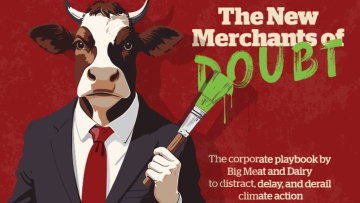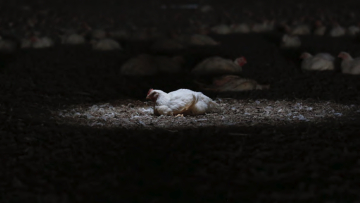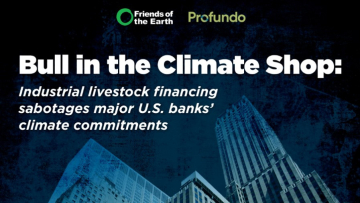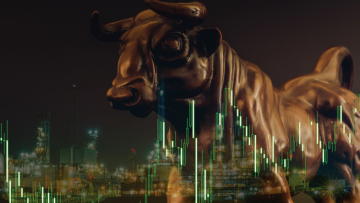Company – On record
This profile is no longer actively maintained, with the information now possibly out of dateBankTrack
nature@banktrack.org
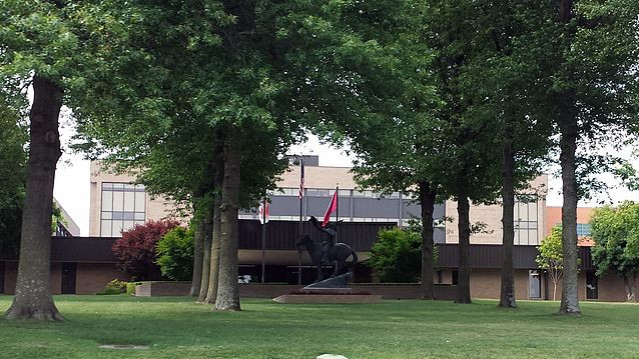
Company – On record
This profile is no longer actively maintained, with the information now possibly out of dateBankTrack
nature@banktrack.org
Why this profile?
Tyson Foods is the second largest meat processor in the world and has multiple records of human rights abuses towards its employees. The company is the second biggest emitter of GHG emissions in the meat and dairy industry and has pleaded guilty to several lawsuits regarding water pollution, gaining the title of top water polluter among US agribusiness companies.
What must happen
Banks should not provide new finance to Tyson Foods until it publicly reports its full supply chain emissions and includes them in its reduction targets with credible timelines. The company must commit to immediately halt the expansion of industrial meat production, and put in place a time-bound plan to eliminate and remediate instances of water and air pollution from its entire supply chain. Existing financiers must engage with Tyson to ensure these outcomes, and if engagement with the company does not bring about results in a timely manner, they should stop financing or divest from the company.
| Sectors | Industrial Livestock Production |
| Headquarters |
|
| Ownership |
listed on NYSE
A complete list of Tyson Foods' shareholders can be found here |
| Subsidiaries |
|
| Website | https://www.tysonfoods.com/ |
Tyson Foods is a US-based company and the world’s second-largest processor and marketer of chicken, beef and pork after JBS. The company was founded in 1935 by John W. Tyson. It has approximately 142,000 employees and operates 123 food processing plants. Tyson is involved in breeding stock, feed production, processing, marketing and transportation of meat, operating primarily in the US but selling its products in approximately 140 countries, with nearly 200 subsidiaries.
Impact on human rights and communities
Violations of workers’ rights
Tyson Foods has been embroiled in numerous cases of violating workers' rights. In 2013, Tyson paid US$4 million in fines due to eight separate incidents between 2006 and 2010 of leakages of anhydrous ammonia, an extremely hazardous substance which causes chemical-type burns, killing at least one worker and injuring nearly a dozen others. In 2016, an Oxfam report found that employees in Tyson’s processing plants were routinely denied bathroom breaks and wore adult diapers to work in order to get through the day. The report detailed how workers were mocked and threatened by their supervisors when asking for breaks, which is particularly hard for women facing menstruations, pregnancy, and higher vulnerability to infections. The requests for breaks were denied due to the pressure to maintain the speed of production. Following the publication of the report, workers delivered a petition with over 100,000 names to Tyson headquarters and later the company announced plans to provide regularly scheduled bathroom breaks. More recently, in 2021 Tyson Foods investors rejected a call to disclose more information about how it protects workers from abuse, voting down a proposal to create a “human rights due diligence report”.
Employment of undocumented immigrants
In 2001, Tyson Foods was indicted for conspiring to smuggle undocumented immigrants across the Mexican border to work in its processing plants. The indictment also accused Tyson of assisting workers to obtain counterfeit work papers to secure employment at 15 of its plants. Six Tyson managers were indicted, two of whom accepted a plea bargain deal, while one tragically committed suicide. However in 2003, Tyson and its managers were acquitted by a federal jury.
In 2006, a class-action lawsuit was filed by Tyson employees, alleging that Tyson’s practice of hiring illegal immigrants led to a 10-30% decrease in wages.
Impact on climate
Tyson Foods is the second biggest emitter of greenhouse gases in the global food industry. The Institute for Agriculture and Trade Policy (IATP) showed that, when accounting for GHG emissions from animal feed production and associated agricultural chemicals, Tyson is one of the largest single contributors to greenhouse gas emissions in the world. According to the IATP, the five biggest meat and dairy companies combined (JBS, Tyson Foods, Cargill, Dairy Farmers of America & Fonterra) emit more GHG emissions than ExxonMobil, Shell or BP.
In June 2021, Tyson Foods set a goal to reach net-zero GHG emissions globally by 2050. As part of this goal, the company stated that it would reach 50% renewable energy use in its US operations by 2030. Three years earlier, the company failed to meet its pledge to improve environmental practices across two million acres of US farmland by 2020. The deadline for this pledge has now been pushed to 2025. The Union of Concerned Scientists described this move as corporate greenwashing and sent an open letter together with over 10,000 consumers calling on Tyson to speed up its process towards sustainability.
Impact on nature and environment
Water pollution
Tyson Foods was identified in 2016 by the Environment America Research and Policy Center as the biggest water polluter among US agribusiness companies. The company and its subsidiaries dumped 104 million pounds of pollutants into waterways from 2010 to 2014 – the second-highest volume of toxic discharges reported to the US Toxic Release Inventory for those years. A substantial portion of Tyson’s discharges are nitrate compounds, which can contribute to algal blooms and dead zones, and also pose threats to human health, including infant methemoglobinemia (commonly referred to as blue baby syndrome). This data does not take into account the manure runoff from raising livestock in the company's supply chain. The Environmental Integrity Project accused Tyson of being a major discharger of pollution to waterways in East Texas, where one of its plants was found to have violated its Clean Water Act permit a dozen times between 2016–2017. In 2019, wastewater from a Tyson plant in Alabama polluted rivers and killed approximately 175,000 fish, an incident for which the state of Alabama is currently suing the company.
Research by Mighty Earth in 2019 found that the largest US meat companies, including Tyson, have built slaughterhouses and processing facilities in flood-prone areas in the Mississippi River Basin without implementing practices to protect water quality. This resulted in 145 million tons of untreated animal waste and other pollutants washing off industrial farms into the Mississippi River in 2018. This has led in turn to the near-record size “dead zone” in the Gulf of Mexico – an area of low to no oxygen that kills fish and other marine life, estimated to be roughly the size of Massachusetts.
The report also found that Tyson Foods and other meat processors' demand for feed crops is driving widespread water contamination across the US, with Tyson being the dominant meat company in the worst-affected regions. This is because Tyson employs huge quantities of corn, requiring more corn fields than the size of New Jersey each year. Moreover, Tyson does not apply any known sustainability screen to its purchases, with companies such as Cargill and Bunge prominently figuring among its suppliers.
Animal welfare
Several investigations have shown cruel treatment of animals in Tyson’s own and contracted facilities, including confinement of animals in small, windowless sheds; forcing birds to live for weeks in their own waste; and leaving animal injuries and illnesses untreated for long periods of time. Unlike many of its competitors, Tyson has not adopted leading animal welfare policies. It has not banned gestation crates for pigs; not abolished battery cages for egg-laying hens; not adopted a slower-growing broiler chicken policy; and has refused to adopt Controlled Atmosphere Killing (CAK) for birds. The company justifies this by saying it does not control its independent contractors, although it is able to specify the animal welfare standards it requires from suppliers.
Impact on pandemics
The further expansion of intensive livestock farming poses an increased risk of new zoonotic diseases. This risk arises both directly, as the expansion of grazing land near natural areas increases contact between cattle and wild animals, risking spillover events, and indirectly, as the circumstances in which livestock is kept create breeding grounds for new varieties of viruses in circumstances where humans work closely with livestock. Additionally, the expansion of soy production into previously forested increases risks, with deforestation and agricultural system change both considered significant factors in the emergence of zoonotic and vector-borne diseases. Finally, the World Health Organisation has stated that the overuse of antibiotics for livestock is considered one of the biggest current threats to global health, food security, and development.
Poor safety during COVID-19
During the COVID-19 pandemic, workers in slaughterhouses were disproportionately impacted due to poor working conditions that allowed the virus to thrive and spread. Tyson Foods failed to close plants where there was an outbreak of the disease, and did not implement the recommended safety measures after the outbreaks began.
In Shelby County, Texas, over half of the reported COVID infections were associated with Tyson’s meat plants employees, resulting in a rate of infections four times higher than the state average. It emerged in a lawsuit over the death of a Tyson employee that a plant manager organised a betting pool on how many employees would contract the disease. After an internal investigation into these allegations, Tyson Foods fired seven of its managers at its Waterloo, Iowa facility, the centre of a COVID outbreak that affected more than 1000 employees. In July 2020, worker advocacy groups filed a civil rights complaint against both Tyson Foods and JBS on their failure to prevent coronavirus outbreaks among their largely black and Latino workers, alleging that this amounted to racial discrimination.
The top financiers of Tyson Foods from 2015 - 2019 are listed below. This information was first published in the report “Butchering the Planet” by Feedback, who commissioned Profundo to conduct a financial analysis of Tyson Foods. For more information on the methodology, see here.

